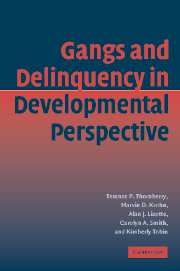Book contents
- Frontmatter
- Contents
- List of Tables and Figures
- About the Authors
- Preface
- Acknowledgments
- 1 A Life-Course Orientation to the Study of Gang Membership
- 2 Research Procedures: The Sample and the Data
- 3 Characteristics of Gang Members
- 4 The Antecedents of Gang Membership
- 5 The Origins of Gang Membership
- 6 Gangs as a Facilitating Context for Delinquent Behavior
- 7 Gangs, Guns, and Crime
- 8 Gangs and Other Law-Violating Youth Groups
- 9 Long-Term Consequences of Gang Membership
- 10 Gangs in Developmental Perspective: Substantive and Policy Implications
- Appendix A: Delinquency Indices
- Appendix B: Prevalence of Gang Membership
- Appendix C: Impact of Gang Membership
- References
- Index
Appendix A: Delinquency Indices
Published online by Cambridge University Press: 23 July 2009
- Frontmatter
- Contents
- List of Tables and Figures
- About the Authors
- Preface
- Acknowledgments
- 1 A Life-Course Orientation to the Study of Gang Membership
- 2 Research Procedures: The Sample and the Data
- 3 Characteristics of Gang Members
- 4 The Antecedents of Gang Membership
- 5 The Origins of Gang Membership
- 6 Gangs as a Facilitating Context for Delinquent Behavior
- 7 Gangs, Guns, and Crime
- 8 Gangs and Other Law-Violating Youth Groups
- 9 Long-Term Consequences of Gang Membership
- 10 Gangs in Developmental Perspective: Substantive and Policy Implications
- Appendix A: Delinquency Indices
- Appendix B: Prevalence of Gang Membership
- Appendix C: Impact of Gang Membership
- References
- Index
Summary
The delinquency indices are based on a series of questions that begin with the phrase, “Since we interviewed you last time, have you …”
General Delinquency
Run away from home?
Skipped classes without an excuse?
Lied about your age to get into some place or to buy something (for example, lying about your age to get into a movie or buy alcohol)?
Hitchhiked a ride with a stranger?
Carried a hidden weapon?
Been loud or rowdy in a public place where someone complained and you got in trouble?
Begged for money or things from strangers?
Been drunk in a public place?
Damaged, destroyed, marked up, or tagged somebody else's property on purpose?
Set fire on purpose or tried to set fire to a house, building, or car?
Avoided paying for things, like a movie, taking bus rides, using a computer, or anything else?
Gone into or tried to go into a building to steal or damage something?
Tried to steal or actually stolen money or things worth $5 or less?
Tried to steal or actually stolen money or things worth $5 to $50?
Tried to steal or actually stolen money or things worth between $50 and $100?
Tried to steal or actually stolen money or things worth more than $100?
Tried to buy or sell things that were stolen?
Taken someone else's car or motorcycle for a ride without the owner's permission?
Stolen or tried to steal a car or other motor vehicle?
Forged a check or used fake money to pay for something?
- Type
- Chapter
- Information
- Gangs and Delinquency in Developmental Perspective , pp. 205 - 209Publisher: Cambridge University PressPrint publication year: 2002



